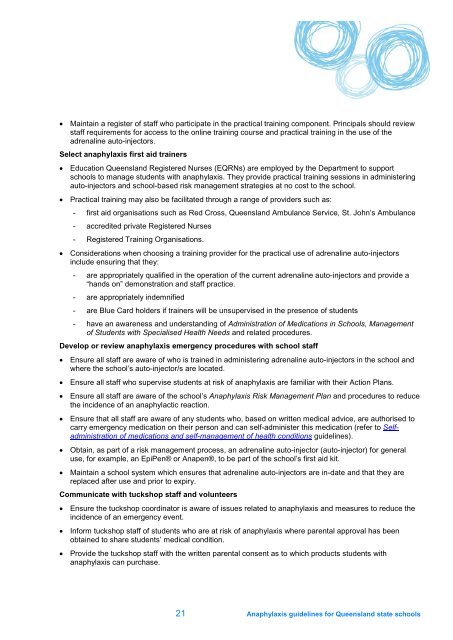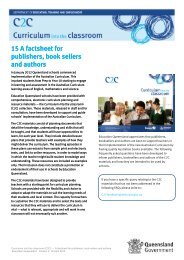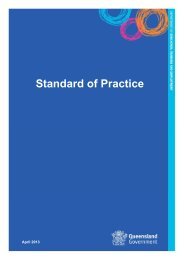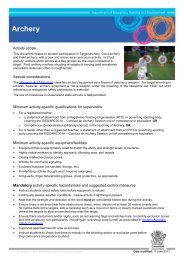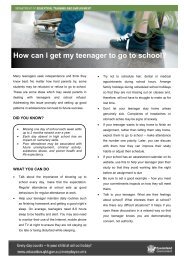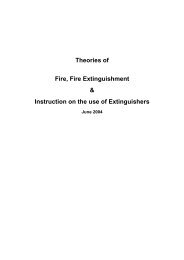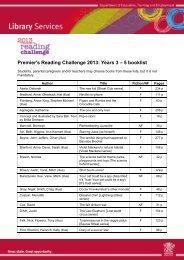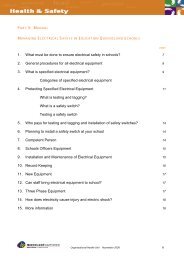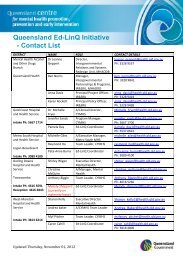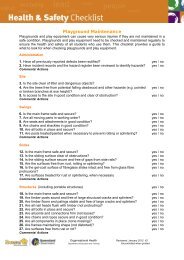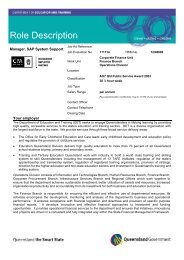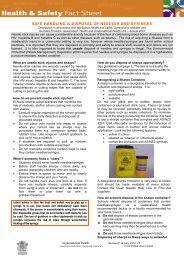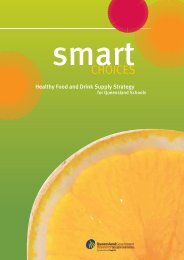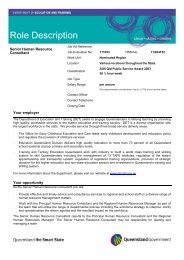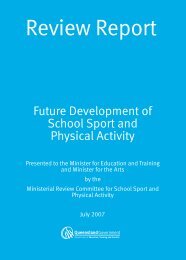Anaphylaxis guidelines for Queensland State Schools - Education ...
Anaphylaxis guidelines for Queensland State Schools - Education ...
Anaphylaxis guidelines for Queensland State Schools - Education ...
Create successful ePaper yourself
Turn your PDF publications into a flip-book with our unique Google optimized e-Paper software.
• Maintain a register of staff who participate in the practical training component. Principals should review<br />
staff requirements <strong>for</strong> access to the online training course and practical training in the use of the<br />
adrenaline auto-injectors.<br />
Select anaphylaxis first aid trainers<br />
• <strong>Education</strong> <strong>Queensland</strong> Registered Nurses (EQRNs) are employed by the Department to support<br />
schools to manage students with anaphylaxis. They provide practical training sessions in administering<br />
auto-injectors and school-based risk management strategies at no cost to the school.<br />
• Practical training may also be facilitated through a range of providers such as:<br />
- first aid organisations such as Red Cross, <strong>Queensland</strong> Ambulance Service, St. John’s Ambulance<br />
- accredited private Registered Nurses<br />
- Registered Training Organisations.<br />
• Considerations when choosing a training provider <strong>for</strong> the practical use of adrenaline auto-injectors<br />
include ensuring that they:<br />
- are appropriately qualified in the operation of the current adrenaline auto-injectors and provide a<br />
“hands on” demonstration and staff practice.<br />
- are appropriately indemnified<br />
- are Blue Card holders if trainers will be unsupervised in the presence of students<br />
- have an awareness and understanding of Administration of Medications in <strong>Schools</strong>, Management<br />
of Students with Specialised Health Needs and related procedures.<br />
Develop or review anaphylaxis emergency procedures with school staff<br />
• Ensure all staff are aware of who is trained in administering adrenaline auto-injectors in the school and<br />
where the school’s auto-injector/s are located.<br />
• Ensure all staff who supervise students at risk of anaphylaxis are familiar with their Action Plans.<br />
• Ensure all staff are aware of the school’s <strong>Anaphylaxis</strong> Risk Management Plan and procedures to reduce<br />
the incidence of an anaphylactic reaction.<br />
• Ensure that all staff are aware of any students who, based on written medical advice, are authorised to<br />
carry emergency medication on their person and can self-administer this medication (refer to Selfadministration<br />
of medications and self-management of health conditions <strong>guidelines</strong>).<br />
• Obtain, as part of a risk management process, an adrenaline auto-injector (auto-injector) <strong>for</strong> general<br />
use, <strong>for</strong> example, an EpiPen® or Anapen®, to be part of the school’s first aid kit.<br />
• Maintain a school system which ensures that adrenaline auto-injectors are in-date and that they are<br />
replaced after use and prior to expiry.<br />
Communicate with tuckshop staff and volunteers<br />
• Ensure the tuckshop coordinator is aware of issues related to anaphylaxis and measures to reduce the<br />
incidence of an emergency event.<br />
• In<strong>for</strong>m tuckshop staff of students who are at risk of anaphylaxis where parental approval has been<br />
obtained to share students’ medical condition.<br />
• Provide the tuckshop staff with the written parental consent as to which products students with<br />
anaphylaxis can purchase.<br />
21 <strong>Anaphylaxis</strong> <strong>guidelines</strong> <strong>for</strong> <strong>Queensland</strong> state schools


